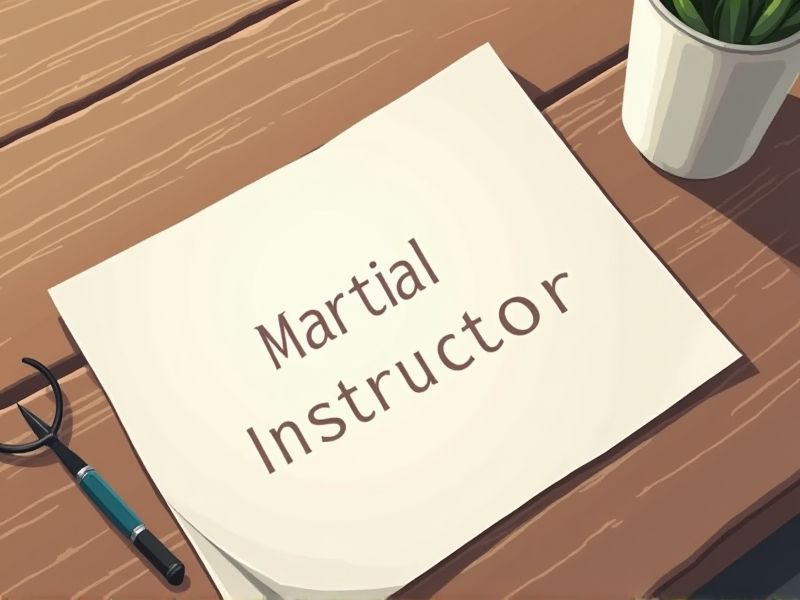
The role of a martial arts instructor involves not only mastering physical techniques but also ensuring the safety and proper training of students. Certifications provide a standard validation of an instructor's expertise and understanding of martial arts principles. These credentials reassure students and guardians about the instructor's proficiency and commitment to teaching excellence. Essential certifications for a martial arts instructor include the following.
Basic Martial Arts Instructor Certification
Basic Martial Arts Instructor Certification ensures instructors possess standardized knowledge and teaching skills critical for effective training. This certification process reduces the risk of injury by ensuring instructors understand safety protocols and techniques. Certified instructors gain credibility, which can attract more students and enhance a school's reputation. Certification helps maintain consistency in teaching quality across different schools and organizations.
Advanced Martial Arts Instructor Certification
Obtaining an Advanced Martial Arts Instructor Certification enhances teaching proficiency, ensuring that martial arts instructors can deliver more effective and comprehensive training. This certification often reflects a deeper understanding of martial arts techniques, which can lead to improved safety for students. It signifies the instructor's commitment to professional development, potentially attracting more students and fostering a stronger reputation. Many martial arts schools or studios may require or prefer certified instructors, influencing career opportunities in the field.
Black Belt Certification
Black Belt Certification ensures that a martial arts instructor has attained a high level of technical expertise and understanding of martial arts techniques. The certification process often includes rigorous training and testing, which verifies the instructor's capability to teach effectively and safely. Students and parents often look for certified instructors as it provides assurance of quality instruction and adherence to standardized practices. Certification may also enhance the reputation of the instructor and the school, leading to increased enrollment and student trust.
CPR and First Aid Certification
A martial arts instructor often works in physically intense environments where students may suffer injuries, requiring immediate attention. CPR and First Aid Certification equips the instructor with the necessary skills to handle medical emergencies, reducing risks during training sessions. This certification ensures that instructors can quickly respond to incidents, potentially preventing severe health outcomes. It also enhances the credibility of the martial arts program, as parents and students feel more secure knowing the instructor is prepared for unforeseen accidents.
Self-Defense Instructor Certification
Obtaining self-defense instructor certification validates a martial arts instructor's expertise in teaching effective and responsible self-defense tactics. The certification ensures that instructors possess up-to-date knowledge of legal considerations pertinent to self-defense situations. Certified instructors can access a broader range of teaching resources and networks, enhancing the quality of their instruction. Students often prefer certified instructors for the assurance of comprehensive and credible training methods.
Competition Coaching Certification
Competition Coaching Certification ensures martial arts instructors have standardized guidelines, enhancing the quality of training. It provides knowledge on safety protocols, reducing the risk of injuries during practice and competition. Instructors with certification gain credibility, attracting more students seeking reputable training. Certified coaches access updated techniques and strategies, keeping their instruction aligned with current martial arts trends.
Youth Martial Arts Instruction Certification
Youth Martial Arts Instruction Certification is necessary because it ensures instructors are equipped with specialized skills to safely teach young students, accounting for their unique developmental needs. Certified instructors are more competent in creating tailored training programs that promote both physical fitness and mental discipline for children. This certification often leads to increased trust from parents who prioritize the safety and effective teaching of their children. Furthermore, certifications can enhance an instructor's credibility and marketability in a competitive industry, potentially leading to better job opportunities and higher income.
Fitness and Conditioning Certification
Understanding fitness and conditioning principles enhances a martial arts instructor's ability to design effective training programs. This certification provides instructors with knowledge to prevent injuries among students through proper warm-up techniques and exercise routines. Expertise in conditioning ensures an instructor can improve students' endurance, strength, and flexibility necessary for martial arts performance. Certification also establishes credibility and professionalism, often required by martial arts schools and organizations for instructor roles.
Conflict Resolution and Anti-Bullying Certification
Bullying remains a significant concern in schools and communities, and martial arts instructors often play a crucial role in shaping young students' behavior. Conflict resolution and anti-bullying certification equips instructors with effective strategies to manage interpersonal disputes and diffuse aggressive situations, promoting a safe learning environment. Certified instructors can better guide students in developing empathy and respect, foundational elements in reducing bullying behavior. Schools and parents increasingly seek programs with certified professionals to ensure children are trained under a holistic approach that emphasizes both physical skills and personal development.
Adapted Martial Arts Instruction Certification
Adapted Martial Arts Instruction Certification ensures instructors can tailor their teaching methods to meet the diverse needs of students with disabilities, enhancing inclusivity. By acquiring this certification, instructors gain specialized skills and knowledge that improve safety and effectiveness in training sessions. It allows schools to expand their student base by accommodating individuals with varying physical and cognitive abilities. This certification demonstrates a commitment to accessibility and helps foster a supportive learning environment for all participants.
Summary
As a reader, understanding that a Martial Arts Instructor's certification can boost your confidence in their teaching abilities provides assurance of quality training. Certification often results in the instructor having a standard curriculum, ensuring consistent and structured learning experiences. This qualification also likely increases the instructor's credibility, attracting more students and potentially enhancing class sizes. Observing an instructor's certification may lead you to expect a safer training environment due to their verified knowledge and skills.
